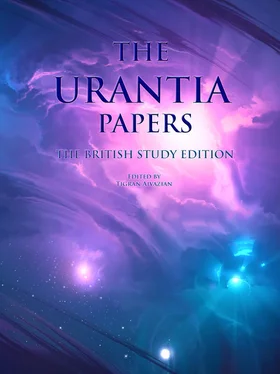195:6.11To say that mind “emerged” from matter explains nothing. If the universe were merely a mechanism and mind were unapart from matter, we would never have two differing interpretations of any observed phenomenon. The concepts of truth, beauty, and goodness are not inherent in either physics or chemistry. A machine cannot know, much less know truth, hunger for righteousness, and cherish goodness.
195:6.12Science may be physical, but the mind of the truth-discerning scientist is at once supermaterial. Matter knows not truth, neither can it love mercy nor delight in spiritual realities. Moral convictions based on spiritual enlightenment and rooted in human experience are just as real and certain as mathematical deductions based on physical observations, but on another and higher level.
195:6.13If men were only machines, they would react more or less uniformly to a material universe. Individuality, much less personality, would be nonexistent.
195:6.14¶ The fact of the absolute mechanism of Paradise at the centre of the universe of universes, in the presence of the unqualified volition of the Second Source and Centre, makes forever certain that determiners are not the exclusive law of the cosmos. Materialism is there, but it is not exclusive; mechanism is there, but it is not unqualified; determinism is there, but it is not alone.
195:6.15The finite universe of matter would eventually become uniform and deterministic but for the combined presence of mind and spirit. The influence of the cosmic mind constantly injects spontaneity into even the material worlds.
195:6.16Freedom or initiative in any realm of existence is directly proportional to the degree of spiritual influence and cosmic-mind control; that is, in human experience, the degree of the actuality of doing “the Father’s will.” And so, when you once start out to find God, that is the conclusive proof that God has already found you.
195:6.17The sincere pursuit of goodness, beauty, and truth leads to God. And every scientific discovery demonstrates the existence of both freedom and uniformity in the universe. The discoverer was free to make the discovery. The thing discovered is real and apparently uniform, or else it could not have become known as a thing.
7. THE VULNERABILITY OF MATERIALISM
195:7.1How foolish it is for material-minded man to allow such vulnerable theories as those of a mechanistic universe to deprive him of the vast spiritual resources of the personal experience of true religion. Facts never quarrel with real spiritual faith; theories may. Better that science should be devoted to the destruction of superstition rather than attempting the overthrow of religious faith — human belief in spiritual realities and divine values.
195:7.2Science should do for man materially what religion does for him spiritually: extend the horizon of life and enlarge his personality. True science can have no lasting quarrel with true religion. The “scientific method” is merely an intellectual yardstick wherewith to measure material adventures and physical achievements. But being material and wholly intellectual, it is utterly useless in the evaluation of spiritual realities and religious experiences.
195:7.3The inconsistency of the modern mechanist is: If this were merely a material universe and man only a machine, such a man would be wholly unable to recognize himself as such a machine, and likewise would such a machine-man be wholly unconscious of the fact of the existence of such a material universe. The materialistic dismay and despair of a mechanistic science has failed to recognize the fact of the spirit-indwelt mind of the scientist whose very supermaterial insight formulates these mistaken and self-contradictory concepts of a materialistic universe.
195:7.4Paradise values of eternity and infinity, of truth, beauty, and goodness, are concealed within the facts of the phenomena of the universes of time and space. But it requires the eye of faith in a spirit-born mortal to detect and discern these spiritual values.
195:7.5The realities and values of spiritual progress are not a “psychologic projection” — a mere glorified daydream of the material mind. Such things are the spiritual forecasts of the indwelling Adjuster, the spirit of God living in the mind of man. And let not your dabblings with the faintly glimpsed findings of “relativity” disturb your concepts of the eternity and infinity of God. And in all your solicitation concerning the necessity for self-expression do not make the mistake of failing to provide for Adjuster-expression, the manifestation of your real and better self.
195:7.6If this were only a material universe, material man would never be able to arrive at the concept of the mechanistic character of such an exclusively material existence. This very mechanistic concept of the universe is in itself a nonmaterial phenomenon of mind, and all mind is of nonmaterial origin, no matter how thoroughly it may appear to be materially conditioned and mechanistically controlled.
195:7.7The partially evolved mental mechanism of mortal man is not overendowed with consistency and wisdom. Man’s conceit often outruns his reason and eludes his logic.
195:7.8The very pessimism of the most pessimistic materialist is, in and of itself, sufficient proof that the universe of the pessimist is not wholly material. Both optimism and pessimism are concept reactions in a mind conscious of values as well as of facts. If the universe were truly what the materialist regards it to be, man as a human machine would then be devoid of all conscious recognition of that very fact. Without the consciousness of the concept of values within the spirit-born mind, the fact of universe materialism and the mechanistic phenomena of universe operation would be wholly unrecognized by man. One machine cannot be conscious of the nature or value of another machine.
195:7.9A mechanistic philosophy of life and the universe cannot be scientific because science recognizes and deals only with materials and facts. Philosophy is inevitably superscientific. Man is a material fact of nature, but his life is a phenomenon which transcends the material levels of nature in that it exhibits the control attributes of mind and the creative qualities of spirit.
195:7.10The sincere effort of man to become a mechanist represents the tragic phenomenon of that man’s futile effort to commit intellectual and moral suicide. But he cannot do it.
195:7.11If the universe were only material and man only a machine, there would be no science to embolden the scientist to postulate this mechanization of the universe. Machines cannot measure, classify, nor evaluate themselves. Such a scientific piece of work could be executed only by some entity of supermachine status.
195:7.12If universe reality is only one vast machine, then man must be outside of the universe and apart from it in order to recognize such a fact and become conscious of the insight of such an evaluation.
195:7.13¶ If man is only a machine, by what technique does this man come to believe or claim to know that he is only a machine? The experience of self-conscious evaluation of one’s self is never an attribute of a mere machine. A self-conscious and avowed mechanist is the best possible answer to mechanism. If materialism were a fact, there could be no self-conscious mechanist. It is also true that one must first be a moral person before one can perform immoral acts.
195:7.14¶ The very claim of materialism implies a supermaterial consciousness of the mind which presumes to assert such dogmas. A mechanism might deteriorate, but it could never progress. Machines do not think, create, dream, aspire, idealize, hunger for truth, or thirst for righteousness. They do not motivate their lives with the passion to serve other machines and to choose as their goal of eternal progression the sublime task of finding God and striving to be like him. Machines are never intellectual, emotional, aesthetic, ethical, moral, or spiritual.
Читать дальше






![Theresa Cheung - The Dream Dictionary from A to Z [Revised edition] - The Ultimate A–Z to Interpret the Secrets of Your Dreams](/books/692092/theresa-cheung-the-dream-dictionary-from-a-to-z-r-thumb.webp)





